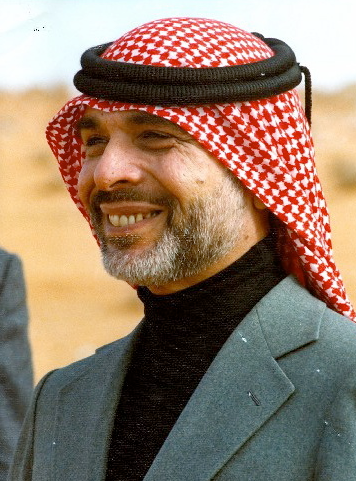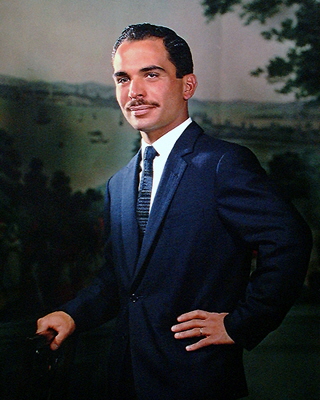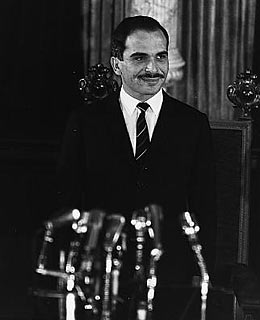<Back to Index>
- King of Jordan Hussein bin Talal, 1935
PAGE SPONSOR



Hussein bin Talal (Arabic: حسين بن طلال; 14 November 1935 – 7 February 1999) was King of Jordan from the abdication of his father, King Talal, in 1952, until his death. Hussein's rule extended through the Cold War and four decades of Arab - Israeli conflict. He recognized Israel in 1994, becoming the second Arab head of state to do so (after Anwar Sadat in 1978 - 1979).
Hussein claimed to be a descendant of the Islamic prophet Muhammad through his belonging to the ancient Hashemite family.
Hussein was born in Amman on 14 November 1935 to Talal bin Abdullah and Princess Zein al-Sharaf bint Jamil. After completing his elementary education in Amman, he was educated at Victoria College in Alexandria. He proceeded to Harrow School in England, where he befriended his cousin Faisal II of Iraq. He pursued further study at the Royal Military Academy, Sandhurst.
On 20 July 1951, Prince Hussein traveled to Jerusalem to perform Friday prayers at the Al-Aqsa Mosque with his grandfather, King Abdullah I, where an assassin opened fire on Abdullah and his grandson. Abdullah was killed, but the 15 year old Hussein survived the assassination attempt, and according to the Jordanian government, pursued the gunman. The Jordanian government claims that the gunman turned his weapon on the young prince, who was saved when the bullet was deflected by a medal on his uniform which had been given to him by his grandfather.
Hussein was appointed Crown Prince of Jordan on 9 September 1951. Abdullah's eldest son, Talal, became King of Jordan, but thirteen months later was forced to abdicate owing to his mental state (European and Arab doctors diagnosed schizophrenia). King Talal's son, Crown Prince Hussein, was proclaimed King of the Hashemite Kingdom of Jordan on 11 August 1952, succeeding at the age of 16; because this was under the legal age, he was enthroned a year later, on 2 May 1953.
King Hussein was married four times (never simultaneously):
- Sharifa Dina bint 'Abdu'l-Hamid (born 1929), on 18 April 1955. She was an Egyptian born third cousin of King Hussein's father, King Talal. A graduate of Cambridge University and a former lecturer in English literature at Cairo University.
They separated in 1956 and were divorced in 1957, at which time Queen
Dina became known as Her Royal Highness Princess Dina Abdul - Hamid of
Jordan. She became an Egyptian citizen in 1963, and in October 1970,
Princess Dina of Jordan married Lieutenant Colonel
Asad Sulayman Abd al-Qadir, alias Salah Taamari, a Palestinian
guerrilla commando who became a high ranking official in the Palestine
Liberation Organization.
- Daughter: H.R.H. Princess Alia bint Al Hussein (born 1956). Married first to Sayyid Nasser Mirza, they had one child together, a son Hussein. They divorced in 1987. She remarried in 1988 to Sayyid Mohammed Al-Saleh; they had two sons, Talal and Abdulhamid.
- Antoinette Avril Gardiner ('Toni Gardiner'),
(born 1941), on 25 May 1961, styled HRH Princess Muna al-Hussein from
marriage. An award winning field hockey player, former typist and
daughter of a British army officer turned innkeeper, Lieutenant Colonel Walter Percy Gardiner,
she was given the title Her Royal Highness Princess Muna al-Hussein and
retained this title after they divorced on 21 December 1971.
- Children:
- His Majesty Abdullah II, King of The Hashemite Kingdom of Jordan (born 1962). Later the King of the Hashemite Kingdom of Jordan. Married to Rania Al-Yassin. They had four children: Prince Hussein, Princess Iman, Princess Salma and Prince Hashem.
- His Royal Highness Prince Faisal bin Al Hussein of Jordan (born 1963). Lieutenant General, former Commander of Royal Jordanian Air Force. Married to Alia Tabbaa (known as Her Royal Highness Princess Alia Tabbaa). They had four children: Princess Ayah, Prince Omar, and twins Princess Sara and Princess Aisha.
- Her Royal Highness Princess Aisha bint Hussein (born 1968). Brigadier General of Royal Jordanian Land Force. Married to Sayyid Zeid Juma, they had two children, a son Aoun and a daughter Muna.
- Her Royal Highness Princess Zein bint Hussein (born 1968, Aisha's twin). Married to Sayyid Majdi Al-Saleh, they had two children: a son Jaafar and a daughter Jumana, and an adopted daughter called Tahani Al Shawan.
- Children:
- Alia Baha el-Din Toukan H.M. Queen Alia al-Hussein (1948
– 1977), on 24 December 1972, after whom Jordan's international airport
(Queen Alia International Airport) is named. She died in a helicopter
crash in Amman, Jordan in 1977.
- Children:
- Her Royal Highness Princess Haya bint Hussein (born 1974). Married to Sheikh Mohammed bin Rashid Al Maktoum, Ruler of Dubai; daughter HH Sheikha Al Jalila.
- His Royal Highness Prince Ali bin Al Hussein of Jordan (born 1975). Married to Rym Brahimi known as Her Royal Highness Princess Rym al-Ali. They had two children, Princess Jalilah and Prince Abdullah.
- Adopted daughter: Abir Muhaisen, (born 1972, adopted 1976). She attended Oldfields School in Glencoe, Maryland, U.S. (boarding school).
- Children:
- Elizabeth Najeeb Halaby (born 1951), (renamed Queen Noor al Hussein on her conversion to Islam), married in Amman on 15 June 1978
- Children:
- His Royal Highness Prince Hamzah bin al Hussein of Jordan (born 1980). Married to Her Royal Highness Princess Noor bint Asem of Jordan, third daughter of His Royal Highness Prince Asem Abu Bakar of Jordan, by his first wife, Princess Firouzeh Vokhshouri. Princess Noor became Her Royal Highness Princess Noor Hamzah of Jordan upon her marriage. They had a daughter, Princess Hayah
- His Royal Highness Prince Hashim bin Al Hussein of Jordan (born 1981). Married to Her Royal Highness Princess Fahdah. They had two daughters: Princess Halaah and Princess Rayet Al Noor.
- Her Royal Highness Princess Iman bint Hussein (born 1983).
- Her Royal Highness Princess Raiyah bint Hussein (born 1986).
- Children:
Hussein was an avid amateur radio operator and an Honorary Member of the Radio Society of Harrow (callsign JY1). A trained aircraft pilot, he was also known for flying airplanes (propeller and jet), as well as helicopters as a hobby.
King Hussein was succeeded as king by his eldest son Abdullah II of Jordan.
In March 1956, Hussein burnished his own nationalist credentials by dismissing Glubb “Pasha” as the commander of the Jordanian Army, and replacing all the British officers with Jordanians. This now mainly Bedouin army was fiercely loyal to him, due to tribal connections.
Hussein's rule was complicated by secret collaboration with Israel and the United States, which often adversely affected the surrounding Arab States and peoples, including the Palestinians. Secret meetings between King Hussein and Israeli foreign ministers Abba Eban and Golda Meir began on or before 1963. At first the meetings took place in London at the home of Dr. Emanuel Herbert, King Hussein's physician. Dr. Herbert, a Jew who desired to help Hussein and the Israeli government became the confidential go-between for contact between Israel and Jordan. Jordan, sharing Israel's longest contiguous border, was interested in maintaining a peaceful coexistence with Israel. Avi Shlaim claims that Hussein's intentions "...throughout the 1960s was to see if there was any way to resolve the dispute with Israel peacefully."
King Hussein sought to understand Israel's position and preferred dialogue to the futility of war with its many dangers. Much of this desire grows out of the threat from other Arab states, specifically the Ba'athist regimes in Iraq and Syria and Nasser's ideology of Arab nationalism which had heavily influenced the Army. The first secret meeting took place on 24 September 1963 between King Hussein and Yaacov Herzog, a diplomat with wide experience and special emissary of prime minister Levi Eshkol. Among other things such as discussions regarding water rights, the purpose of the meetings were to plan and support Israeli and Jordanian initiatives in combating Fatah guerrillas. Hussein accepted minor raids into Jordanian territory by the Israeli Defense Forces. He would later state "I told them I could not absorb a serious retaliatory raid, and they accepted the logic of this and promised there would never be one".
On 13 November 1966, the Israeli military conducted a major incursion into Jordanian territory, violating their secret agreement with King Hussein, in what became known as the Samu Incident. Two days later, in response to the incident, in a memo to U.S. President Lyndon B. Johnson, his Special Assistant Walt Rostow wrote: "retaliation is not the point in this case. This 3000 man raid with tanks and planes was out of all proportion to the provocation and was aimed at the wrong target," and went on to describe the damage done to U.S. and Israeli interests:
They've wrecked a good system of tacit cooperation between Hussein and the Israelis... They've undercut Hussein. We've spent $500 million to shore him up as a stabilizing factor on Israel's longest border and vis-ŕ-vis Syria and Iraq. Israel's attack increases the pressure on him to counterattack not only from the more radical Arab governments and from the Palestinians in Jordan but also from the Army, which is his main source of support and may now press for a chance to recoup its Sunday losses... They've set back progress toward a long term accommodation with the Arabs... They may have persuaded the Syrians that Israel didn't dare attack Soviet - protected Syria but could attack U.S. - backed Jordan with impunity.
Perception of King Hussein's secret collaboration with Israel led to great dissatisfaction of his rule both at home and throughout the Arab World. President Gamal Abdul Nasser of Egypt often referred to Hussein as "an "imperialist lackey". Army Commander - in - Chief General Sharif Zaid Ben Shaker warned in a press conference that "If Jordan does not join the war a civil war will erupt in Jordan". In order to maintain credibility in the Arab world and maintain stability at home, on 30 May 1967, King Hussein signed a mutual defense treaty with Egypt, and handed over command of the Jordanian military to Egyptian generals.
In June 1967, as a result of what later became known as the Six Day War Jordan lost control of the West Bank and east Jerusalem and saw its military shattered. In addition the country was, for a second time, overrun with many Palestinian refugees, fleeing the Israeli assault. Much like after the 1948 war, Israel did not allow the fleeing refugees to return to the territories it had captured during the war. As a result, Palestinian refugees who fled the 1948 and 1967 wars, outnumbered Jordan's natural citizens. Most refugees were provided citizenship by the Hussein regime. Due to their sheer numbers, Palestinian factions in Jordan were able to exercise considerable authority essentially governing some areas of Jordan, leading to many considering them a state within a state, eroding Hussein's central authority.
In September, 1970, Hussein ordered the forcible expulsion of the Palestine Liberation Organization by the Jordanian military. The attacks on Palestinian fighters lasted until July, 1971, when thousands of Palestinians were expelled, mostly fleeing to Lebanon.
After the death of Egyptian president Gamal Abdel Nasser, his successor, Anwar Sadat, made several offers of peace and recognition, in return for the Egyptian lands captured by Israel during the Six Day War. The Israeli government rejected all offers, in line with U.S. secretary of state Henry Kissinger's stalemate policy. Sadat warned that Egypt would attempt to recapture the territories through war, but the Israeli government, perhaps due to the perception of the Israeli military invincibility after the Six Day War, dismissed Sadat's threat as empty posturing.
Egyptian president Anwar Sadat and Syrian president Hafez al-Assad met King Hussein in 1973 to discuss the possibility of war. Hussein, fearing another loss of territory to Israel, declined. Furthermore, Hussein was suspicious of Sadat's promise to PLO Chairman Yasser Arafat to hand over the West Bank to the Palestinians in the event of a victory, as he considered the West Bank to be Jordanian territory. On the night of 25 September, Hussein secretly flew to Tel Aviv to warn Israeli Prime Minister Golda Meir of an impending Syrian attack. "Are (the Syrians) going to war without the Egyptians, asked Mrs. Meir. The king said he didn't think so. 'I think they [Egypt] would cooperate'".
On 6 October 1973, Syria and Egypt attacked Israel without the aid of Jordan. The war led to Israel taking Sadat seriously and engaging in negotiations which resulted in the return of captured Egyptian territories and the recognition of Israel by Egypt.
In 1994, Hussein concluded negotiations to end the official state of war with Israel resulting in the Israel – Jordan Treaty of Peace which he had begun negotiating in secret with the Israelis in the 1960s. Between 1963 – 1994 he had held at least 55 secret meetings with leading Israelis including at least seven prime and foreign ministers.
Due to the close relationship forged with Israeli Prime Minister Yitzhak Rabin during the negotiations of the treaty, Hussein was invited to give a speech during Rabin's funeral.
On 13 March 1996 the “Summit of the Peacemakers” was held at Sharm el-Sheikh, Egypt hosted by Egyptian President Hosni Mubarak. In addition to King Hussein, Turkish President Süleyman Demirel, Israeli Prime Minister Shimon Peres, U.S. President Bill Clinton and Russian President Boris Yeltsin were present at the summit. The summit was convened with the expressed aim of putting the Israeli - Palestinian peace process back on track after a period of increased tension and hostility.
Hussein was often involved in negotiations between the Israelis and Palestinians. His 11th hour intervention in January 1997 is said to have brought Palestinian Chairman Yasser Arafat and Israeli Prime Minister Benjamin Netanyahu to an agreement on the long awaited withdrawal of Israeli troops from most of the West Bank town of Hebron.
In October 1998 U.S. President Bill Clinton invited Hussein, who was in the U.S. undergoing chemotherapy treatment for cancer, to attend the Wye Plantation talks. Hussein received a standing ovation at the ceremony and praise from Clinton.
At the end of July 1998 it was made public that Hussein was diagnosed with lymphatic cancer by doctors at the Mayo Clinic. Hussein's lymphoma was of a type that responded to chemotherapy, which the King had already begun and his physicians were optimistic he could be cured. Speaking on Jordanian television via satellite, Hussein reassured the Jordanian people that the cancer was curable. Nevertheless, he looked fragile and pale. It was the 62 year old monarch's second bout with cancer; he lost a kidney to the disease in 1992.
On his way back to Jordan in January 1999, Hussein stopped in London. Doctors advised him to rest and stay in England for a few weeks, as he was still too fragile to travel. According to Jordanian government sources, Hussein stated that:
-
- "I need very much to feel the warmth of my people around me, there is work to be done and I will get the strength from my people to finish the business."
Upon returning to Jordan Hussein was greeted by family members, ministers, parliament members, foreign dignitaries and a crowd of Jordanian citizens, estimated by Jordanian government officials of 2 million.
Just before his death, Hussein made a change to his will, disinheriting the heir apparent of several decades, his brother Hassan, in favor of his eldest son Abdullah. He abruptly returned to the U.S. clinic on 25 January 1999 for further treatment undergoing a failed bone marrow transplant after which he returned to Jordan.
On 7 February 1999 King Hussein died of complications related to non Hodgkin's lymphoma. He was, at the time of his death, one of the longest serving leaders in international politics. He had been the King of Jordan for over 46 years, during which he was an important actor in various Middle East conflicts. Just prior to his death, during an interview with CNN's Christiane Amanpour Hussein expressed his opinion that a peaceful resolution would eventually be reached in the Arab - Israeli conflict.
King Hussein's funeral was held on 8 February 1999 in the presence of all five of his sons, foreign dignitaries and statesmen, and an estimated 800,000 Jordanians. The UN General Assembly held an Emergency Special Session in "Tribute to the Memory of His Majesty the King of Jordan" on the same day.
- "He won the respect and admiration of the entire world and so did his beloved Jordan. He is a man who believed that we are all God's children, bound to live together in mutual respect and tolerance." (U.S. President, Bill Clinton)
- "He was an extraordinary and immensely charismatic persuader for peace. At the peace talks in America
when he was extremely ill, he was there, talking to both sides, urging
them forward, telling them nothing must stand in the way of peace." (U.K.
Prime Minister, Tony Blair)